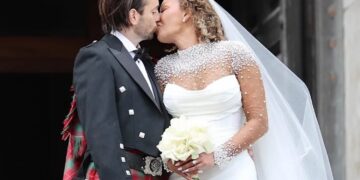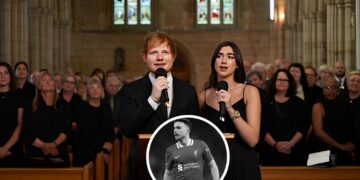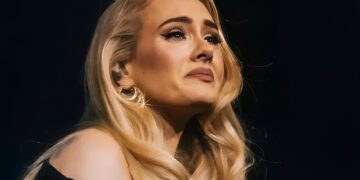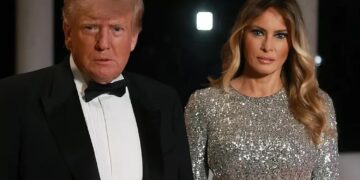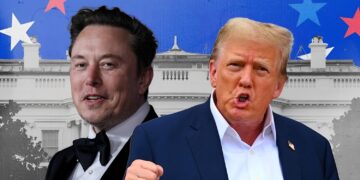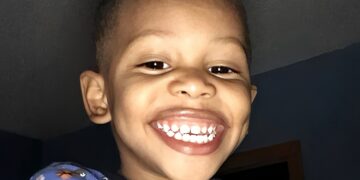You saw an extraordinary act of public resistance unfold when four drag performers chose to attend a Kennedy Center production of Les Misérables—the very same night President Donald Trump and First Lady Melania Trump were in the audience. The performers, affiliated with drag activism group Qommittee, included Vagenesis, Mari Con Carne, Tara Hoot, and drag king Ricky Rosé. They arrived in full drag, intentionally and proudly claiming space in a venue that has recently become a battleground in the national conversation about LGBTQ+ rights and representation.

Their appearance didn’t just turn heads—it sparked applause. Audience members cheered them on before later expressing mixed reactions, including audible boos and a few supportive chants, as the former President entered. The moment served as a striking reminder that public stages are not just for performances—they are platforms for protest, especially in a political climate where drag artists continue to be targeted by legislation and rhetoric from conservative leaders.
Why Their Attendance Meant So Much More Than Just Watching a Show
For the Qommittee, this was more than a night out at the theater. It was a calculated decision rooted in defiance and pride. A representative for the collective explained that their presence was about “who gets to exist in public spaces and whose stories get to be told on America’s stage.” That comment spoke directly to how drag performers across the country are being erased from public life through restrictions, book bans, and criminalization efforts.
The group didn’t try to hide the symbolism of their protest. They made it clear: this was about challenging policies that attempt to erase LGBTQ+ identities and visibility. The representative continued, “We’re not going anywhere. Americans don’t have to agree on everything, but we should be able to speak our minds and perform our art without bans, retaliation, or intimidation.” Those words highlight the tension many performers feel today—the struggle not only to create but to simply be seen.
Vagenesis Sends a Message to Trump and His Supporters
Vagenesis didn’t hold back when asked about the meaning behind her decision to attend the performance that evening. “Hopefully this lets that fool and his whole administration know that we will always exist,” she said. “No matter what kind of narrative he wants to spin.” Her message directly refutes claims that drag performances pose a threat or moral problem. Instead, she framed drag as joyful, artistic expression that has always belonged in the cultural conversation. “We aren’t here to hurt or groom or manipulate anybody,” she added. “We just wanna enjoy art.”
Her statement underscores a broader point shared by many performers and LGBTQ+ advocates: drag is not a threat. It is a celebration of identity and creativity. And by showing up, Vagenesis and her peers wanted to remind the audience—and the Trumps—that they will not be erased or shamed into silence.

Mari Con Carne Brings Immigrant Strength and Bold Defiance
Mari Con Carne brought another powerful layer to the night’s protest: her own identity as an immigrant. She explained that knowing Trump would be in the room made her feel even more compelled to attend. “I wanted it to be known that you can prevent us from performing on your stages, but you can’t erase us from your presence,” she said.
Mari’s comment referenced broader immigration issues and the ICE deportations that have increased public anxiety for many immigrants, especially those in LGBTQ+ communities. She didn’t just attend for herself. She showed up for every immigrant who has been made to feel unwelcome under the current administration’s policies. “We aren’t going anywhere,” she said. “And we will face you head-on with every ounce of courage that we have.”
Ricky Rosé Reflects on Art, History, and Political Pushback
For Ricky Rosé, the moment held special meaning beyond the immediate political context. As a returning performer at the Kennedy Center, Rosé explained the venue once stood as a national beacon for the arts, created to celebrate creativity across every medium. “Beyond politics, the Kennedy Center was founded more than 50 years ago as a place meant to celebrate the arts in its truest, most extraordinary form,” he said.
He pointed out that even President John F. Kennedy recognized the arts as essential during turbulent times. Rosé emphasized that appearing in drag that night was about more than a statement—it was about belonging. “It was an honor to support the cast of Les Misérables and take up space despite this administration’s attempt to erase us,” he added. He also noted the irony that the drag artists received a far warmer welcome from the audience than the President himself.
Tara Hoot Lives Her Own Lesson on Courage and Visibility
Tara Hoot is known for hosting storytime events for children, where she reads books about strength, identity, and kindness. She saw this appearance as a chance to live those values in front of a national audience. “I often read books about being brave, being strong, and being true to who you are,” she said. “Showing up to the Kennedy Center with my fellow drag stars allowed me to live those words and lessons for all to see.”
Her statement drives home a key point about visibility: showing up in public, especially in hostile spaces, is an act of bravery. It’s a lesson not just for kids, but for adults too—about how to resist in a way that’s authentic and unapologetic.
Larger Protests Against Trump’s Artistic Influence Are Growing
This performance was part of a growing wave of cultural resistance to Trump’s influence over institutions like the Kennedy Center. After Trump declared himself chairman of the venue and dismissed Biden-era appointees, artists and performers began to back out of events. The cast of Hamilton canceled their visit. Actress Issa Rae pulled her sold-out show, saying the administration’s involvement clashed with the values of inclusion the venue once stood for.
That sentiment has echoed throughout the artistic community, where performers increasingly feel that their stages are being politicized in ways that threaten freedom of expression. The Kennedy Center is not just a stage—it is a symbol. And right now, who is allowed on that stage has become a deeply political issue.
RuPaul’s Drag Race Stars and Other Performers Continue Speaking Out
Drag stars from other platforms have also weighed in on how government policies are impacting LGBTQ+ lives. Aja, a trans performer currently featured on RuPaul’s Drag Race All Stars 10, recently described receiving a passport that misgenders her—despite all her documentation identifying her as female. She called it a quiet but dangerous form of discrimination that could jeopardize both her safety and her career. “Now I’m being forced to choose between my safety and my career,” she wrote.
Hormona Lisa, a queen from RuPaul’s Drag Race season 17, added her voice to the mix. She expressed deep frustration over efforts to ban trans women from participating in women’s sports. “It’s crazy and hard to find words,” she said. “We’re going backwards with how these people don’t see us as human.”
Art Will Always Find a Way to Speak—and Resist
Drag has always been a form of protest, a bold and beautiful act of defiance in the face of repression. For decades, LGBTQ+ artists have used performance as a way to claim space, tell their stories, and resist invisibility. The performance at the Kennedy Center was not just about a night at the theater—it was about resisting silence and making sure that LGBTQ+ voices remain visible, loud, and unapologetically proud.
.@realDonaldTrump gets cheered and booed at the Kennedy Center. pic.twitter.com/KgLDhqceLD
— Jeff Mason (@jeffmason1) June 11, 2025
How Can the Arts Keep Resisting in Politicized Spaces Like the Kennedy Center? Let us know in the comments on Facebook.
Via: Entertainment Weekly


